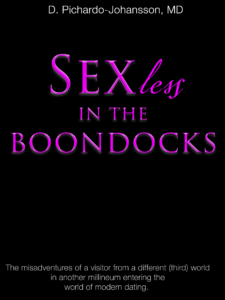The magical power of delusional thinking

Have you ever believed something even when all evidence was against you?
I do that every year. It’s called my New Year’s resolutions. “Sure, I never before stuck to this exercise program (or diet, or study routine), but this time it will be different. All because one day, long ago, Julius Cesar decided that January 1st was ‘New Year.’” (The truth? The Earth rotates endlessly around the sun, and doesn’t care about calendars).
Everybody I know has some crazy belief. Think about the delusion that a Louis Vuitton bag is worth $3000. Just because it has a logo on it! (Really? Is it going to carry my wallet and my make up any better than my twenty-dollar bag?). Take the lottery—the odds of hitting it are infinitesimal—yet people who complain of money trouble consistently spend money on it (renting hope) instead of investing it. Think about our different concepts of beauty. I know a lady who’s paid hundreds of dollars on an eye-drop to make her eyelashes grow extra long. She looks scary to me—like she has two tarantulas on her eyelids—yet, she loves it. Go figure.
Maybe we’re all delusional. But that’s okay. Some of the biggest accomplishments of my life are thanks to delusional thinking. Take motherhood. If I could talk to the twenty-something-year-old me deciding to have a baby, I’d slap her. I’d hold her by the arms and shake her, yelling, “Are you out of your mind?! Do you have any idea what you’re getting into—trying to handle a baby AND going through medical residency? Who do you think you are?”
And yet I took the plunge, and somehow it worked out.
Delusional thinking also saved me when I had to face dating after my divorce. The statistics didn’t look good. I was a thirty-something-year-old single mother of FOUR––one of the kids, a little girl with special needs––living in The Boondocks, surrounded by 80-year-olds.
Luckily, my whole life prepared me for that moment. The moment of summoning the magic of delusional thinking.
My mental processes are a strange combination of serious science and magical thinking. Between my medical degree and my master’s on clinical investigation, I’ve taken more classes on the scientific method and statistics than a human being should. At the same time, I have no idea how I grew up half-sane among so many strange, magical beliefs. Every culture and family has its superstitions. But the Dominican Republic, where I grew up, takes the gold in that event.
In the DR everybody knew (not “believed” but “knew-as-the-sacred-thruth”) that if you saw a moth flying around your gas lamp, you’d have an unexpected visitor. If your eyelid was twitching, you were about to see someone you loved. But if the visitor was unwanted, or stayed too long, you didn’t have to despair. Taking the broom and and placing it behind a door with three grains of coarse salt on top, would magically make the visitor leave. Older people around me sworn this trick was fail-proof—I don’t doubt it. Any visitor would get a hint to leave, seeing the host do something that strange.
The list of magical beliefs in the DR could fill a book(*) and enter the realm of science. I grew up hearing my father tell the proud story of how his humble country community defeated a spiffy team of international meteorologists because the locals could predict rain better than their scientist’s fancy machines. They did it by studying the scratching habits of a donkey. “José’s mule scratched her back on the coconut tree. That means it’s going to rain”—It never failed.
And Dominicans not only can predict rain, but they can also summon it! Chanting to a saint called “San Isidro Labrador,” you can request a break from the DR’s eternally sunny skies. “San Isidro Labrador, pon el agua y quita el sol.”
Medicine wasn’t exempt from superstition. My uncle Ramón was sought for his healing powers since he was a baby. His father—my paternal grandfather—died while my uncle was still in my grandmother’s womb. In the DR it was a common believe that kids like him—orphans before birth— had the power to heal thrush by blowing their breath on people.
And don’t get me started on the industry of beliefs directed to finding a husband! Light a candle to St. Anthony. Put his picture upside down. Go to “La botica” and buy the little bottle with odorless colored water which promises the power of “Bringing him in a jump” or “Tying him up forever”––No, you don’t drink the water: You splash it over yourself or use it in pre-determined rituals.
Speaking of what. Everybody knew if a young woman was serving coffee to guests in a house, the last person to take a cup of coffee should always take also the tray from her hands. Leaving the young woman with an empty tray was guaranteed to curse her with becoming a Jamona (a spinster). You could also become a Jamona if you opened your umbrella inside the house, or if you dared to try on a wedding dress before being engaged. And in the DR, where women were so little value, and your only hope to mean something to society was having children, there was no worst curse imaginable than becoming a Jamona.
And yet, before you decide that the entire population in the DR needs to be locked up, hear this:
The Diagnostic and Statistical Manual of Mental Disorders, Fifth Edition (DSM-5) defines delusions as “false beliefs based on incorrect inference about external reality that persist despite the evidence to the contrary.” Luckily they throw in a free pass by adding “and these beliefs are not ordinarily accepted by other members of the person’s culture or subculture.”
So, technically, all those beliefs don’t qualify as delusions, because they’re accepted by everybody.
There you go! No matter how crazy your belief, if you find enough people to go along with you, it’s not officially a reason to call you psychotic.
Did studying the scientific method and being a researcher make me scorn my fellow Dominicans and their magical beliefs? Not really. In a way, I understand them. When you feel powerless, having something intangible to blame for your misfortunes is a consolation. When poverty and lack of hygiene is decimating the infant population with horrendous gastroenteritis and lethal infections, it’s easier to say “My kid got the Evil Eye from a jealous person for being so beautiful” than it is saying “I’m poor; our nutrition is horrible and the water is filthy. The government doesn’t care, and there’s nothing I can do about it.”
(By the way: the Evil Eye is still considered a dead serious matter. To prevent it, babies must wear a little ebony hand hanging from their bracelet. They drilled the rules in my brain so much, I still can’t get myself to compliment a baby without saying “God bless him” immediately—It’s well known that people can accidentally put the Evil Eye on the baby otherwise.)
Magical thinking enabled the fantasy of having control over something. “I can’t control that my daughter has so little opportunity in this country. But I can control that we don’t do anything that would make her become a Jamona. And if everything fails, I’ll resort to San Antonio or La botica.”
The interesting thing is that it worked— at least as a sedative. Magical thinking became a soothing balm to console us and allow us to keep going.
And even the hard-core researchers face the possibility that believing something strongly enough can end up making it happen for real. (They”ll never admit it, but they do.) They call it “bias” and “the placebo effect.”
The highest quality clinical studies are “double blinded.” That means that neither the investigator, nor the patient can be aware of who’s getting the real treatment and who’s getting the placebo (inert drug or sugar pill given to the control group). Otherwise, the researcher’s desire to see a difference in favor of his drug can accidentally affect the results. He may hallucinate the evidence that the patient is improving and may unknowingly convince (hypnotize) the patients in the treatment arm to feel better. That’s called bias.
But the best part is the placebo effect. Patients can’t know if they’re getting the real drug, or they will convince themselves that they’re feeling better. And they do! Actually, no clinical trial I’m aware of has ever reported a 0% response rate for the placebo arm. People receiving a placebo, when they believe it’s a real drug, can have symptomatic response and even radiographically proven improvement.
And if you want more proof that delusional thinking works, think about physicists with their whole “If you decide the electron is a particle, it works like a particle. If you decide it’s a wave, it works as a wave.”
So in summary: 1- No idea is officially crazy if you convince other people to believe it with you. In a world where people walk next to each other seeing different realities, all it takes is to decide what reality you want to part-take of, and hang out with people who believe in what you want to believe. In other words, make sure to only hang out with people who support your dreams.
2- Even scientists admit our minds can influence the physical universe. If you believe strongly that a remedy will work, it will work—if anything, by making you feel better.
3- Since we all have delusions, chose one that feels good.
So, back to that time after my divorce, I had two choices. I could go with my scientific brain and believe the grim statistics in front of me, or I could summon the power or magical thinking and have faith, that is, choose my delusions carefully
And that’s what I did. I made the decision to believe in soulmates.
And my ultimate delusion: I made a decision to believe that a loving universe wanted me to be happy and listened to me when I asked for help.
So, armed with those two delusions, I undertook my journey to find my soulmate.
And guess what? I’m married to him now.
And how did that happen?
You know what I’m going to say now, don’t you?
“That’s another story.”
Love,
Diely
*: For more funny/crazy Dominican beliefs click here. And even that list wasn’t complete, so you can read even more here.
stayed tuned for the continuation of sexless in the boondocks: The misadventures of a visitor from a different (third) world in a new millennium, reentering the world of modern dating


If you liked this story, you may also like:
Coming soon
Playing with The Boys.
Rosa’s Guide to Singlehood (Pedicures Botox and a Vibrator)
